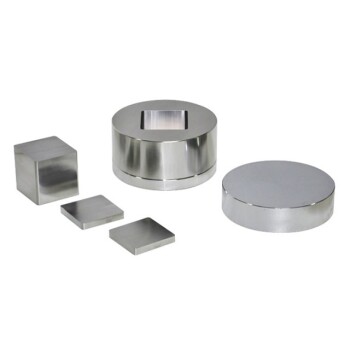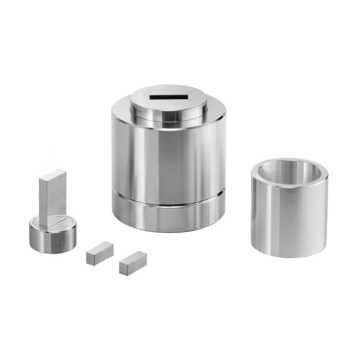In essence, a laboratory press is a versatile tool used to apply precise force and often heat to a material on a small scale. Its applications range from preparing samples for chemical analysis and testing the strength of new materials to molding prototypes and creating small production runs of specialized parts.
A laboratory press is not just one tool, but a foundational platform for material transformation. Its core purpose is to apply controlled pressure—and sometimes temperature—to create, test, or prepare materials for further analysis, making it indispensable in research, development, and quality control.

The Core Function: Applying Controlled Force and Heat
A laboratory press translates a scientific concept into a physical, testable object. Its primary function is to exert a specific, measurable amount of force onto a material contained within a mold or between two flat surfaces called platens.
From Raw Material to Testable Sample
The fundamental goal is to change a material's form. This could mean compressing a loose powder into a solid pellet, forming a polymer into a specific shape, or bonding two layers of material together.
The Role of Heat: Hot vs. Cold Pressing
Many laboratory presses are hot presses, equipped with heated platens. The addition of heat is critical for processes like curing polymers, molding thermoplastics, and laminating, where temperature activates the material's properties. Typical models can reach 350°C and apply up to 40 tons of force.
Primary Applications in Research & Development (R&D)
In an R&D setting, the press is a fundamental instrument for discovery and characterization.
Sample Preparation for Spectroscopic Analysis
This is one of the most common applications. Techniques like Fourier-transform infrared spectroscopy (FTIR) and X-ray fluorescence (XRF) require thin, uniform, and homogenous samples for accurate readings.
A press is used to compress a powdered material, often mixed with potassium bromide (KBr), into a solid, semi-transparent pellet. This eliminates inconsistencies and allows the analytical beam to pass through the sample evenly.
Materials Testing and Characterization
Engineers and material scientists use presses to investigate the physical properties of substances. By compressing a material until it fails, they can measure its compressive strength and durability. They also study how different materials behave under extreme pressure.
Developing New Formulations
When creating new polymers, composites, or ceramics, a laboratory press is used to mold the raw compound into a standardized shape (like a bar or disc). This newly formed sample can then be subjected to a battery of tests to evaluate its properties.
Beyond the Lab: Applications in Small-Scale Production
The versatility of laboratory presses extends beyond pure research into prototyping and specialized manufacturing.
Compression and Transfer Molding
Presses are used to form parts from materials like rubber and plastics. In compression molding, the material is placed directly in a heated mold cavity and pressed into shape. This is ideal for developing prototypes and validating mold designs before scaling up.
Laminating and Bonding
By applying both heat and pressure, a press can bond layers of different materials together. This is used to create laminates, textiles, and other composite structures for testing or specialized use.
Lean Manufacturing and Prototyping
For short production runs or cell manufacturing, a lab press is a cost-effective tool. It allows for the creation of a limited number of parts without the massive investment required for industrial-scale production machinery.
Understanding the Trade-offs and Limitations
While versatile, a laboratory press is a specific tool with clear boundaries. Understanding its limitations is key to using it effectively.
Not a Mass Production Tool
The core distinction is scale. Laboratory presses are designed for precision, control, and flexibility, not high-volume output. Their cycle times are much longer, and their size is limited, making them unsuitable for mass production.
The Importance of Platen Size and Force
The physical dimensions of the platens (e.g., a common 200mm x 200mm) and the maximum force (e.g., 20-40 tons) define the absolute limit of what you can create. Always ensure your sample or mold fits within these operational constraints.
Manual vs. Automated Control
Presses can be manual, requiring an operator to pump a hydraulic jack, or automated, with programmable pressure and temperature cycles. Manual presses are simple and robust, while automated presses offer superior repeatability and precision, which is critical for scientific testing and quality control.
Making the Right Choice for Your Goal
Your intended outcome dictates how you will use a laboratory press.
- If your primary focus is analytical chemistry (e.g., FTIR, XRF): You need a press to create consistent, homogeneous pellets or thin films for accurate spectroscopic measurement.
- If your primary focus is materials science R&D: You will use the press for compression molding novel polymers, testing the physical strength of new composites, or studying material behavior under high pressure.
- If your primary focus is prototyping or specialized production: The press is your tool for lean manufacturing, allowing you to create limited runs of molded or laminated parts to test a design or fulfill a small order.
Ultimately, the laboratory press is the essential bridge between raw material and a functional, analyzable result.
Summary Table:
| Application Area | Key Uses |
|---|---|
| Sample Preparation | Creating pellets for FTIR, XRF analysis |
| Materials Testing | Measuring compressive strength, material behavior |
| R&D & Prototyping | Molding polymers, developing new formulations |
| Small-Scale Production | Compression molding, laminating, short runs |
Ready to elevate your laboratory's capabilities? KINTEK specializes in high-quality lab press machines, including automatic, isostatic, and heated presses, designed to meet the precise needs of laboratories in R&D, sample preparation, and prototyping. Our equipment ensures superior control, repeatability, and efficiency for your material transformation tasks. Contact us today to discuss how our solutions can drive your success and streamline your processes!
Visual Guide

Related Products
- Automatic Laboratory Hydraulic Press Lab Pellet Press Machine
- Laboratory Hydraulic Press 2T Lab Pellet Press for KBR FTIR
- Manual Laboratory Hydraulic Press Lab Pellet Press
- Automatic Laboratory Hydraulic Press for XRF and KBR Pellet Pressing
- Manual Heated Hydraulic Lab Press with Integrated Hot Plates Hydraulic Press Machine
People Also Ask
- How do hydraulic press machines ensure precision and consistency in pressure application? Achieve Reliable Force Control for Your Lab
- How are hydraulic pellet presses used in educational and industrial settings? Boost Efficiency in Labs and Workshops
- What are the key steps for making good KBr pellets? Master Precision for Flawless FTIR Analysis
- What is the purpose of creating pellets for XRF spectroscopy using a hydraulic press? Ensure Accurate and Repeatable Elemental Analysis
- How are hydraulic presses used in the preparation of powder mixtures? Achieve Precise Compaction for Accurate Analysis



















